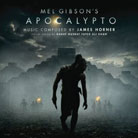March 2007
Braveheart was the first collaboration between Mel Gibson and James Horner. Its battle scenes are among the most violent on film, and Horner’s score highlighted the action wonderfully. Gibson and Horner approached Apocalypto with even more abject brutality, and it has put Horner back on cue. Horner uses synthesizers in place of a large orchestra, which adds an oppressive, brutal tone to the story of primal fear and survival. What it lacks is consistent structure. Much of the score is written for heavy drumming and rhythmic battle cries, which intensify the primal quality of the chase but add little dimension to characters. Even not having seen the film, I am almost certain that this is by design. Horner does offer some melodic interludes that contribute to the humanity of the characters. "Holcane Attack," "Games and Escape" and "Civilisations Brought By Sea" are among my favorite tracks because they build to a payoff, rather than settle for awe and shock. They remind one why Horner’s earlier work is so memorable. The recording is fittingly dynamic and clean. Deep-bass notes are perfectly captured, and the sound of guest vocalist Rahat Nusrat Fateh Ali Khan is strikingly atmospheric. This sort of testosterone-rich music should be played by coaches before the big game. The score for Apocalypto is one of Horner’s most original efforts in years. GO BACK TO: |
 James Horner - Apocalypto
James Horner - Apocalypto